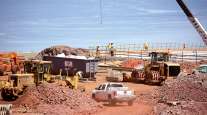Senior Reporter
ATA President Chris Spear Presses House Panel on IIJA Oversight, Freight Workforce

[Stay on top of transportation news: Get TTNews in your inbox.]
WASHINGTON — Advancing supply chain connectivity programs and promoting the freight workforce are priorities American Trucking Associations President Chris Spear called on Congress to pursue over the next two years.
Addressing the House of Representatives’ Transportation and Infrastructure panel on Feb. 1 as it kicked off the 118th session of Congress, Spear emphasized a need to continue to recruit and retain truck drivers, while at the same time ensuring commercial corridors are safe and efficient for the freight sector.
In wide-ranging testimony, Spear reminded House lawmakers about the trucking industry’s role in the supply chain. During the COVID-19 pandemic, commercial vehicle drivers’ contributions were praised by private sector stakeholders, myriad elected officials and much of the public. The $1.2 trillion Infrastructure Investment and Jobs Act enacted in 2021 boosted funding designed to improve supply chain connectivity operations. The Biden administration is managing implementation of those programs.
“For 90 years, ATA has helped Congress shape its understanding of our nation’s infrastructure needs and supply chain challenges, and today’s oversight of both is welcome and timely,” Spear told the committee. “Prior to IIJA’s passage, ATA testified 25 times before the House and Senate, sharing how the decaying state of our nation’s infrastructure is hamstringing America’s ability to compete with rising global powers like China. In short, a first-world economy cannot survive a developing-world infrastructure.”
Expanding access to parking for truck drivers, as well as promoting workforce training programs, would result in benefits for the economy, Spear explained. ATA recently determined the trucking workforce is short about 78,000 drivers, a slight decrease from a previous estimate.
“We have an aging workforce, higher than the national average. As they exit, if we do not replace those drivers, that 78,000 is going to increase to 150,000 over the next eight to 10 years. And that’s unacceptable. Our ability to service this economy is going to be inhibited if we don’t bring in new talent,” Spear told lawmakers. Regarding discussions about employment classification industrywide, he added, “You take away our independent contractors, you’re going to pay more for everything we eat, drink and wear. You think inflation is bad now. It makes it only worse.”
Specific to oversight of the IIJA, Spear noted that ATA joined freight stakeholders in calling on the Biden administration to withdraw a memorandum from the Federal Highway Administration that outlined guidelines for states’ allocation of highway funding. ATA and the other groups argued that the guidance complicates project planning decisions for states. Top congressional Republicans on Capitol Hill have interpreted the FHWA memo as suggesting state transportation agencies prioritize infrastructure maintenance instead of proceeding with new construction, but U.S. Department of Transportation leaders insist the memo’s viewpoints are merely intended as guidance for industry stakeholders and agencies.

Host Seth Clevenger speaks with Torc Robotics CEO Peter Vaughan Schmidt about the realities of autonomous truck technology and how they fit into the freight transportation industry. Hear the program above and at RoadSigns.TTNews.com.
As Spear put it, the FHWA memo “does nothing to address congestion, improve safety and reduce emissions.”
Additionally, the ATA leader asked lawmakers to focus carefully on ocean shipping reforms that result in the efficient flow of freight, as well as to consider an achievable energy and environmental agenda.
“By resolving key supply chain bottlenecks, making port operations fairer and more efficient, and taking meaningful steps toward environmental sustainability, we can grow our economy and ensure American competitiveness for generations to come,” Spear observed.
The panel’s leadership expressed optimism about the infrastructure law’s potential for modernizing transportation networks. Committee Chairman Sam Graves (R-Mo.) affirmed his caucus’ commitment to conduct oversight of the Biden administration.
“What we have to do is make sure Congress and this committee ensure the money from IIJA is spent responsibly and is directed toward making our nation’s transportation supply chain more efficient and resilient,” Graves said. “We owe it to the American people to do just that.”
Want more news? Listen to today's daily briefing above or go here for more info
Rep. Rick Larsen (D-Wash.), the committee’s ranking member, praised the passage of big-ticket measures covering infrastructure and climate change policies. “Without the investments made by the major laws enacted last Congress, our economy would be in far worse shape today,” Larsen said. “This committee held a hearing on industry and labor perspectives on the supply chain crisis in November 2021 — where witnesses, many of whom are here again today, hailed the passage of the [bipartisan infrastructure law] and its positive impacts to improve our freight network supply chain.”
Lawmakers recently introduced a bill that would dedicate nearly $800 million to expand truckers’ access to parking around the country. Sponsored by Reps. Dusty Johnson (R-S.D.) and Jim Costa (D-Calif.), the Safer Highways and Increased Performance for Interstate Trucking, or SHIP IT, Act, would provide funding through fiscal 2026.
Witnesses who joined Spear in testifying included Jeff Firth, vice president of Hamilton Construction on behalf of Associated General Contractors of America; Roger Guenther, executive director of the Port Houston; Greg Regan, president of the Transportation Trades Department with the AFL-CIO; and Ian Jefferies, president and CEO of Association of American Railroads.
“In such an interconnected supply chain, every segment must be robust. Only through working together can we maximize supply chain performance and keep our economy moving,” Jefferies told the panel.




